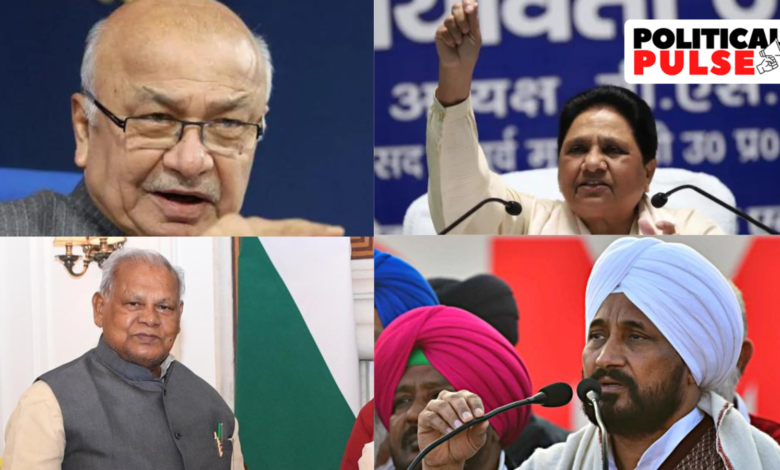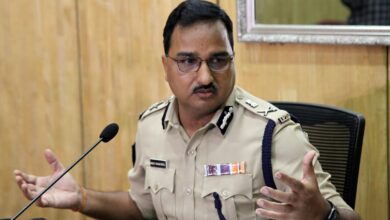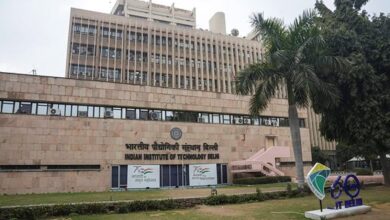As Sushilkumar Shinde looks back on his career, a look at India’s eight Dalit CMs | Political Pulse News

At an event to launch his memoir, former Maharashtra Chief Minister Sushilkumar Shinde thanked the party leadership for appointing him Maharashtra Chief Minister, pointing out that appointing a person from a Dalit as CM was not an easy thing to do. “Yes, Sushilkumar Shinde is fair, speaks well, looks like a Brahmin … to make an SC the CM, only Sonia Gandhi ji could have done it,” Shinde said at the event in Delhi on Monday.
Of late, the Congress’s Sirsa MP Kumari Selja has also been playing up the chances of Haryana getting its first Dalit CM if the party returns to power. Selja is from a Dalit community and is seen to be making her case for the top job in the state.
India has had only eight Dalit CMs till date. Three were from Bihar and one each from Andhra Pradesh, Rajasthan, Uttar Pradesh, Punjab, and Maharashtra.
Damodaram Sanjivayya, Andhra Pradesh
(January 11, 1960, to March 12, 1962)
India’s first-ever Dalit CM was Damodaram Sanjivayya. Taking the reins of Andhra Pradesh at the age of 39, he was also the youngest CM at the time.
The son of a farm labourer, Sanjivayya graduated from the Madras Law College in 1948. As a student, he participated in the freedom movement, beginning his association with the Congress.

In 1956, he became the third president of the state Congress Committee, a position he held until 1961. In the 1957 Assembly polls, the Congress won 187 of the 301 seats in the state and Neelam Sanjeeva Reddy became the CM. However, a factional fight in the middle of the term led to Sanjivayya emerging as a consensus candidate for the CM’s post.
Following the 1962 elections, Reddy again replaced Sanjivayya, who went on to become the first Dalit president of the All India Congress Committee. In 1964, he entered the Rajya Sabha and served as the Minister of Labour and Employment in the Lal Bahadur Shastri government. He died of a heart attack in 1972 at the age of 51.
Bhola Paswan Shastri, Bihar
(March 22, 1968, to June 29, 1968; June 22, 1969, to July 4, 1969; June 2, 1971, to January 9, 1972)
Born to a poor family in Purnia in 1914, Bhola Paswan Shastri was a freedom fighter who made history when he became Bihar’s first Dalit CM in 1968.
Called “Shastri” for his academic achievements, he held the post thrice between 1968 and 1972. He first became the CM for 100 days in the fourth Bihar Assembly (1967-1968). But the Congress lost its majority, necessitating a mid-term poll. When the party split in June 1969, Harihar Singh’s Congress government collapsed and Shastri sided with the Congress (Organisation) faction and became the CM for 13 days. But his coalition proved unstable. In June 1971, he joined Indira Gandhi’s Congress (Requisitionists) faction and became the CM for seven months in the run-up to the 1972 Assembly polls.
He later represented Bihar in the Rajya Sabha between 1972 and 1982 and briefly served as the Leader of the Opposition in 1978. He died in 1984.
Ram Sundar Das, Bihar
(April 21, 1979, to February 17, 1980)
Ram Sundar Das’s ascendance in Bihar was shaped by the popular uprising against the Indira Gandhi government during Emergency and later the infighting within the Janata Party.
Born in Bihar’s Sonpur in 1921, Das studied at the Vidyasagar College in Kolkata only to drop out to join the Quit India Movement. He worked with the Praja Socialist Party and even unsuccessfully contested the 1957 Lok Sabha polls on its ticket from Hajipur. He later won the constituency in 1991 and 2009.
In the 1977 Assembly elections, Das was elected the Sonpur MLA. But soon afterwards, there was infighting in the party over then CM Karpoori Thakur’s decision to implement the Mungeri Lal Commission report, which recommended reservation for Backward Classes in government jobs.
Upper-caste members of the Janata Party had tried to water down the reservation policy by unseating Thakur as the CM. To wean away Dalit MLAs, Das was nominated as the CM. Though Das and Thakur were both socialists, Das was considered more moderate and accommodative than the latter. Thakur resigned and Das became the CM in 1979.
Das died in 2015.
Jagannath Pahadia, Rajasthan
(June 6, 1980, to July 13, 1981)
Jagannath Pahadia was the first and, to date, only Dalit CM of Rajasthan. Having been active in the Congress since Jawaharlal Nehru’s time, Pahadia was close to the Nehru-Gandhi family.
A veteran of Rajasthan politics, Pahadia was a four-time Lok Sabha MP between 1957 and 1984. He was also elected to the Rajya Sabha in 1965 and re-elected the following year. In Rajasthan, he served as a four-time MLA between 1980 and 2008.
Pahadia was known to have become close to Sanjay Gandhi during Emergency, standing by the latter. Gandhi rewarded him with the CM’s post, much to the dislike of many party leaders in Rajasthan, in 1980. However, after Gandhi’s death that year, Pahadia began facing opposition within the party.
Indira Gandhi was learnt to have been rather displeased with him when during a function to celebrate poet and writer Mahadevi Verma the CM criticised her for using words that “common people never understood”. Months later, Pahadia was asked to resign.
Hailing from a village in Bharatpur, Pahadia held an MA and two law degrees. He also served as a Union minister in multiple Congress governments. He served as the Governor of Bihar from 1989 to 1990, and of Haryana from 2009 to 2014. He died of Covid-19 in 2021.
Mayawati, Uttar Pradesh
(June 3, 1995, to October 18, 1995; March 21, 1997, to September 21, 1997; May 3, 2002, to August 29, 2003; May 13, 2007, to March 15, 2012)
Mayawati is, perhaps, the most illustrious of all Dalit CMs in India. She is not only still the first Dalit woman CM but one who became CM on the strength of her party rather than being appointed by a mainstream party for political symbolism or as a compromise candidate. Mayawati is a four-time CM, with her latest tenure from 2007 to 2012.
Born to a lower-middle-class family in New Delhi, Mayawati attended Kalindi College and Meerut University before getting a law degree from the Faculty of Law, University of Delhi.
She was mentored in politics by BSP founder Kanshi Ram, whose Bahujan movement permanently altered UP politics. She first became the CM in 1995 after breaking an alliance with the Samajwadi Party (SP) and tying up with the BJP. She became the CM for the second time in 1997 when a BJP-BSP government was formed following the 1996 elections. In 2002, Mayawati again became the CM with the support of the BJP, only to resign a year later. In 2007, she secured a landslide victory in the state polls and became the first UP CM to complete a full term.
Sushilkumar Shinde, Maharashtra
(January 18, 2003, to November 4, 2004)
A former Maharashtra Police constable, Sushilkumar Shinde was brought into politics in the early 1970s by Sharad Pawar, then in the Congress. He went on to become one of the tallest Congress leaders in Maharashtra and a staunch Gandhi family loyalist.
In 2003, when factionalism broke out in the Maharashtra Congress and then CM Vilasrao Deshmukh’s position became untenable, Shinde was Sonia Gandhi’s first choice for the post. He became the first Dalit CM in Maharashtra, where politics are generally dominated by Marathas. Shinde, however, was replaced by Deshmukh again following the 2004 Assembly polls.
Shinde’s first electoral contest was from a reserved constituency in the 1974 Assembly polls. However, in all his subsequent elections he contested from unreserved seats and won as many as four elections on the trot from 1978 to 1990. As the state’s Finance Minister, he has presented a record nine Budgets. He was the Union Power minister between 2006 and 2012 and the Union Home Minister between 2012 and 2014.
Jitan Ram Manjhi, Bihar
(May 20, 2014 to February 20, 2015)
Jitan Ram Manjhi became the CM in the aftermath of the drubbing that the CM Nitish Kumar-led Janata Dal (United) suffered at the hands of the BJP in the 2014 Lok Sabha polls.
Kumar took responsibility for the defeat, which came months after he split from the NDA, and made Manjhi the CM. But after just 10 months in office, the party asked him to resign to make way for Kumar but Manjhi refused. He eventually resigned as the CM and was expelled from the JD(U). He then floated the Hindustan Awami Morcha, which is currently a BJP ally. Manjhi is now a Union Minister.
Born to farm labourer parents in Gaya, Manjhi entered politics in 1980 and has been with almost all the parties in Bihar.
Charanjit Singh Channi, Punjab
(September 20, 2021 to March 12, 2022)
Charanjit Singh Channi became Punjab’s first Dalit CM in 2021 when the Congress, sensing a wave of unpopularity against then CM Captain Amarinder Singh, decided that a Dalit CM face would be its best bet for state polls the following year. Channi, however, could not deliver the state and lost his own Chamkaur Sahib seat in the 2022 polls.
Channi, who studied law at Panjab University and has an MBA from Punjab Technical University, started his political career as a municipal councillor from a ward in Kharar and was elected president of the Kharar municipal council in 2002.
Between 2015 and 2016, Channi was the Leader of the Opposition in the Punjab Assembly and was the Minister of Technical Education and Training in the second Amarinder Singh government from 2017 to 2021. He is currently the Lok Sabha MP from Jalandhar.







